When it comes to charging your Nissan Leaf with a 15Amp extension, it’s important to have the right knowledge and tools to ensure safe and efficient charging. In this guide, I will provide you with valuable information on the different charging options available for your Nissan Leaf, including portable charging stations and accessories. Whether you’re charging at home or on the go, this guide will help you make informed decisions to power up your Nissan Leaf hassle-free.
Electric vehicles are becoming increasingly popular, and it’s essential to have reliable and convenient charging solutions. The Nissan Leaf is no exception, offering multiple options to suit your needs. From Level 1 charging with standard 120-V outlets to Level 3 DC fast charging at public stations, there is a charging option that fits your lifestyle and requirements.
In this guide, I will walk you through the process of charging your Nissan Leaf at home with a 15Amp extension, including the different levels of charging and the benefits of each option. I will also provide insights into charging at public stations and the importance of using the right extension cord for safe and efficient charging. Additionally, I will discuss some essential safety considerations and suggest additional charging accessories that can enhance your Nissan Leaf charging experience.
Key Takeaways:
- Understanding the different charging options available for your Nissan Leaf
- The benefits and considerations of charging at home with a 15Amp extension
- Charging your Nissan Leaf at public charging stations
- Choosing the right extension cord for safe and efficient charging
- Ensuring safety precautions when charging with an extension
Charging Options for Nissan Leaf
The Nissan Leaf offers a range of charging options to cater to your specific needs and preferences. Understanding these options can help you determine the best charging infrastructure for your Nissan Leaf, ensuring efficient and convenient charging experiences. Additionally, professional installation of a charging station may be required for Level 2 and Level 3 charging.
- Level 1 Charging:
- Level 2 Charging:
- Level 3 Charging:
Level 1 charging utilizes standard 120-V outlets, making it a convenient option for home charging. While it may be slower than other options, Level 1 charging allows you to plug your Nissan Leaf into a regular household outlet using a portable charging cable. This method typically adds approximately 2 to 5 miles to your Leaf’s driving range every hour.
Level 2 charging is suitable for both home and public charging, offering faster charging times than Level 1. With Level 2 charging, you will need a standard 220-240-V outlet and a dedicated 50 amp circuit, along with the installation of additional charging equipment. This option can fully charge your Nissan Leaf within approximately 7.5 to 11 hours, depending on your battery capacity.
Level 3 charging, also known as DC fast charging, is available at public charging stations. This option provides the quickest charging times and is ideal for on-the-go charging. Level 3 charging can replenish up to approximately 80% of your battery’s charge in just 30 minutes, significantly reducing your charging time during longer journeys.
Comparison of Charging Options for Nissan Leaf:
| Charging Option | Charging Speed | Typical Charging Location | Charging Time |
|---|---|---|---|
| Level 1 Charging | Slow | Residential | Approximately 2-5 miles of driving range per hour |
| Level 2 Charging | Medium | Residential and public | Approximately 7.5 to 11 hours for a full charge |
| Level 3 Charging (DC Fast Charging) | Fast | Public charging stations | Up to approximately 80% charge in 30 minutes |
By considering the different charging options available for your Nissan Leaf, you can select the infrastructure that best suits your charging requirements. Whether you prefer the convenience of Level 1 charging at home, the versatility of Level 2 charging, or the speed of Level 3 charging at public stations, the choice is yours.
Charging at Home with a 15Amp Extension
When it comes to charging your Nissan Leaf at home with a 15Amp extension, you have two options: Level 1 charging and Level 2 charging. Let’s explore both of these charging solutions in detail.
Level 1 Charging
To begin with, Level 1 charging involves plugging your Nissan Leaf into a standard 120-V outlet using a portable charging cable. While this is a slower charging option, it still offers the convenience of home charging. With Level 1 charging, you can expect to add approximately 2 to 5 miles to your Leaf’s driving range every hour.
Level 2 Charging
For faster charging times, Level 2 charging is the way to go. This option requires a 220-240-V outlet and a dedicated 50 amp circuit, along with the installation of additional charging equipment. With Level 2 charging, you can fully charge your Nissan Leaf within approximately 7.5 to 11 hours, depending on your battery capacity.
Level 2 charging provides a more efficient and convenient solution, especially if you need to recharge your Leaf quickly. It is worth noting that the installation process for Level 2 charging may require the expertise of a professional electrician to ensure everything is set up correctly and safely.
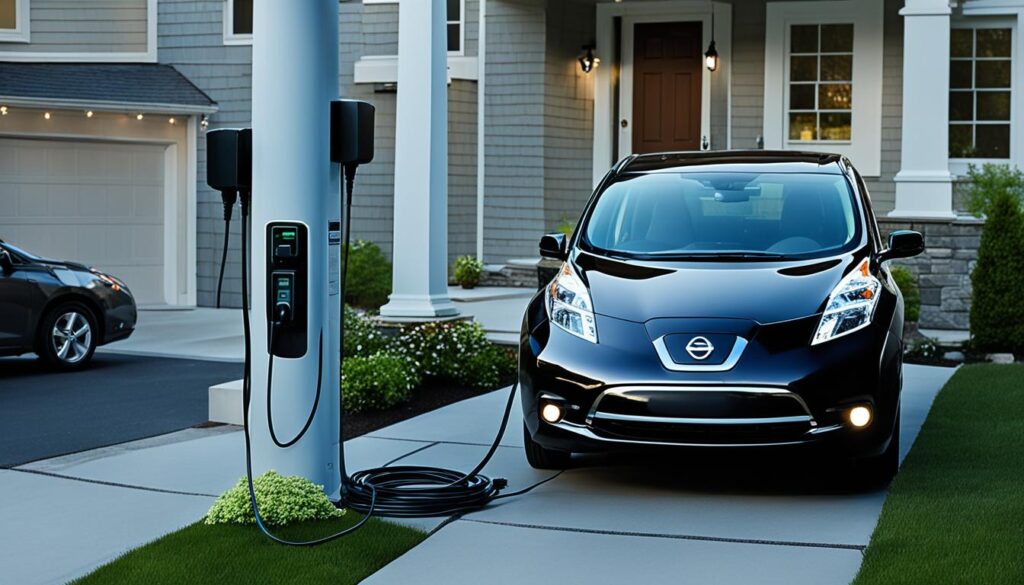
With the ability to charge your Nissan Leaf at home, you can enjoy the convenience and cost savings of avoiding public charging stations. Whether you opt for Level 1 or Level 2 charging, having a reliable EV charger for your Nissan Leaf is crucial for a seamless charging experience.
Charging at Public Charging Stations
When on the go, you can charge your Nissan Leaf at public charging stations. These stations are typically found at various locations such as grocery stores, gyms, movie theaters, and shopping centers. Public charging stations offer Level 2 charging and, in some cases, Level 3 DC fast charging. Level 2 charging at public stations can add approximately 10 to 25 miles to your Leaf’s range per hour of charging. DC fast charging at public stations can replenish up to approximately 80% of your battery’s charge in just 30 minutes, significantly reducing charging time.
Public charging stations provide a convenient solution for electric vehicle owners, allowing you to charge your Nissan Leaf while running errands or enjoying leisure activities. With Level 2 charging, you can easily add significant range to your battery during a visit to the grocery store or the gym. DC fast charging, on the other hand, offers a rapid charge when you’re short on time and need to quickly recharge for your next journey.
When choosing public charging stations, consider their proximity to your regular destinations and the availability of charging stations in those areas. Planning your trips accordingly can help you make the most of public charging options and ensure a smooth and convenient charging experience for your Nissan Leaf.
Take a look at the table below, which provides an overview of the charging options available at public charging stations:
| Charging Level | Approximate Range Added per Hour of Charging | Charging Time for 80% Battery Capacity |
|---|---|---|
| Level 2 | 10 to 25 miles | N/A |
| DC Fast Charging | N/A | 30 minutes |
This table provides a summary of the charging options available at public charging stations for your Nissan Leaf. Please note that charging times and range added may vary depending on the specific charging station and the condition of your vehicle’s battery.
Choosing the Right Extension Cord
When it comes to charging your Nissan Leaf with a 15Amp extension, selecting the appropriate extension cord is crucial to ensure safe and efficient electric car charging. Here are some key factors to consider when choosing the right extension cord:
- Quality: Opt for a high-quality extension cord specifically designed for electric car charging. It should be durable, weather-resistant, and capable of handling the power requirements of your Nissan Leaf.
- Gauge: Look for an extension cord with a 10/3 or similar gauge. The gauge refers to the thickness of the wires inside the cord, with a lower gauge indicating a thicker wire. A thicker wire can handle higher current flow, minimizing the risk of overheating or voltage drop during charging.
- Length: Consider the length of the extension cord based on your charging needs. Using a shorter cord can help minimize power loss and ensure efficient charging. However, make sure it is long enough to reach your power source without straining the cord or compromising safety.
- Amperage Rating: Ensure that the extension cord is rated for continuous use at 20 amps. Although your Nissan Leaf’s charging capacity is 15 amps, using an extension cord with a higher amperage rating helps prevent overheating and power loss.
By choosing the right extension cord, you can confidently charge your Nissan Leaf with a 15Amp extension, knowing that you have a safe and reliable charging solution.
Safety Considerations for Charging with an Extension
When it comes to charging your Nissan Leaf with a 15Amp extension, safety should always be your top priority. Ensuring that you follow the necessary precautions can help protect both you and your vehicle from potential hazards. Here are some essential safety considerations to keep in mind:
Inspect the Extension Cord Regularly
Before each charging session, it’s crucial to inspect the extension cord you intend to use. Look for any signs of frayed or damaged wires, as these can pose a significant risk. If you notice any issues, do not use the cord and replace it immediately.
Use a Cord Rated for Outdoor Use
When selecting an extension cord for charging your Nissan Leaf, make sure it is specifically rated for outdoor use. Using an indoor-rated cord in an outdoor environment can increase the risk of electrical accidents. Always check the cord’s specifications and choose one that is suitable for outdoor charging.
Ensure Proper Grounding
Proper grounding is essential for safe charging. When connecting the extension cord to a power source, make sure it is properly grounded to prevent electrical shocks or fires. Be sure to follow the manufacturer’s instructions or consult with a professional electrician if you are unsure about the grounding process.
Avoid Multiple Extension Cords
Using multiple extension cords connected together may seem like a convenient solution, but it can be hazardous. It can increase the risk of overheating, voltage drop, and electrical faults. Instead, opt for a single extension cord that is long enough to reach your Nissan Leaf without the need for additional connections.
“Safety should always be the top priority when charging your Nissan Leaf. By following these precautions, you can ensure a safe and reliable charging experience with your 15Amp extension.”
By being mindful of these safety considerations, you can confidently charge your Nissan Leaf using a 15Amp extension while minimizing risks. Remember, a safe charging routine will not only protect you and your vehicle but also contribute to a worry-free electric driving experience.
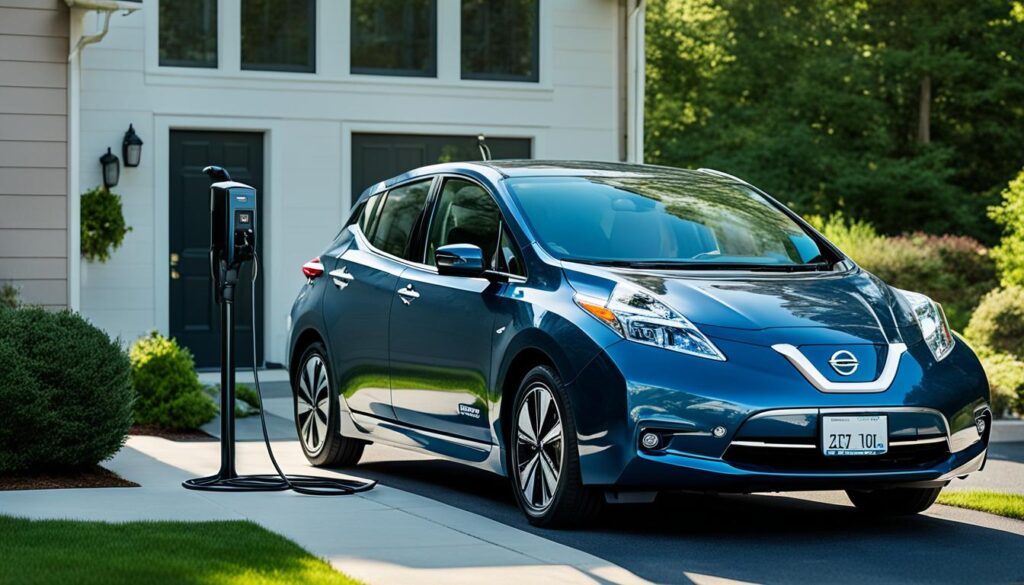
Additional Charging Accessories for Nissan Leaf
Enhance your charging experience with a range of accessories designed specifically for your Nissan Leaf. These accessories provide added convenience and functionality, allowing you to make the most of your electric vehicle charging. Whether you’re looking for a dedicated charging solution at home or a portable option for charging on the go, there are accessories available to meet your needs.
Wall-Mounted Charging Stations
Wall-mounted charging stations offer a convenient and efficient way to charge your Nissan Leaf at home. These stations are professionally installed and provide a dedicated charging point, ensuring a reliable and fast charging experience. With a wall-mounted charging station, you can easily plug in your Leaf and have it charged up in no time. This is especially beneficial for those who prefer to have a designated area for charging their electric vehicle.
Portable Charging Cables
For those who are always on the move, portable charging cables are essential accessories for charging your Nissan Leaf. These cables allow you to connect your vehicle to various charging points, such as public charging stations or outlets at a friend’s house. Portable charging cables are compact, lightweight, and easy to carry, making them perfect for travel or emergency charging situations. With a portable charging cable, you can charge your Leaf wherever you go, ensuring you never run out of power.
Charging Timers
Charging timers are useful accessories that allow you to schedule your Nissan Leaf’s charging sessions. With a charging timer, you can set specific charging times, taking advantage of off-peak electricity tariffs to save on charging costs. By programming your Leaf to charge during low-demand periods, you can maximize the efficiency of your charging process and reduce your overall electricity expenses. Charging timers are easy to use, allowing you to customize your charging schedule according to your preferences and lifestyle.
Investing in these additional charging accessories can greatly enhance your Nissan Leaf charging experience. Whether you choose a wall-mounted charging station for home use, a portable charging cable for on-the-go convenience, or a charging timer to optimize your charging costs, these accessories ensure a seamless and efficient charging process for your electric vehicle.
Conclusion
Charging your Nissan Leaf with a 15Amp extension provides you with efficient and convenient charging solutions for your electric vehicle. By understanding the various charging options and considering safety precautions, you can ensure a safe and effective charging experience. Additionally, incorporating additional charging accessories can enhance your charging setup and optimize your Nissan Leaf’s charging capabilities.
When it comes to charging options, the Nissan Leaf offers Level 1 and Level 2 charging options. Level 1 charging, using a standard 120-V outlet and a portable charging cable, can add 2 to 5 miles to your Leaf’s driving range per hour. On the other hand, Level 2 charging requires a 220-240-V outlet and additional charging equipment, enabling faster charging times and fully charging your Leaf within 7.5 to 11 hours.
When using a 15Amp extension cord for charging, it is crucial to choose the right cord that is suitable for electric car charging. Look for a high-quality extension cord with a suitable gauge, such as 10/3, and ensure it is rated for 20A continuous use to match the Leaf’s charging capacity. Also, prioritize safety by regularly inspecting the extension cord for any damages and ensure it is rated for outdoor use and properly grounded.
In addition to the charging options and extension cord considerations, you can enhance your charging experience with accessories like wall-mounted charging stations, portable charging cables, and charging timers. These accessories provide dedicated charging solutions at home, convenience on the go, and opportunities to save on charging costs through scheduled charging times.





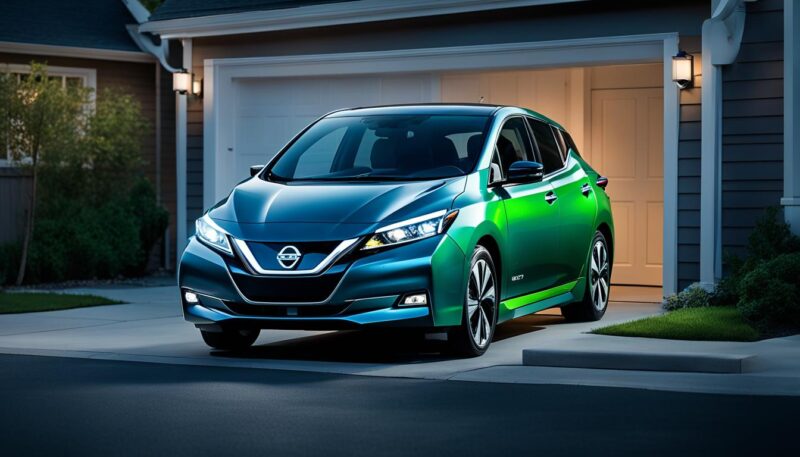


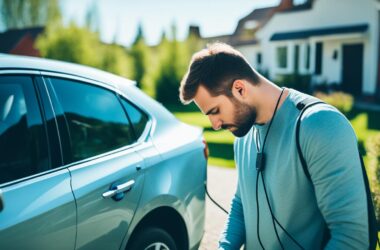
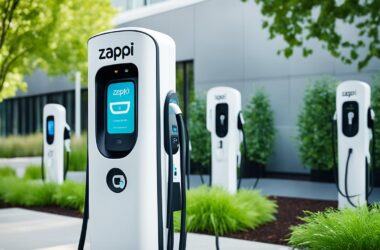
I saw a lot of website but I conceive this one has something extra in it in it
Do you mind if I quote a few of your posts as long as I provide credit and sources back to your site? My blog is in the exact same area of interest as yours and my users would certainly benefit from a lot of the information you provide here. Please let me know if this ok with you. Many thanks!
Greetings! I’ve been following your website for a while now and finally got the courage to go ahead and give you a shout out from Atascocita Tx! Just wanted to mention keep up the excellent work!
I am curious to find out what blog platform you’re utilizing? I’m experiencing some minor security problems with my latest blog and I would like to find something more safe. Do you have any solutions?
Fantastic beat ! I wish to apprentice whilst you amend your website, how can i subscribe for a weblog site? The account helped me a applicable deal. I have been tiny bit acquainted of this your broadcast provided brilliant transparent concept
I like this site so much, saved to fav.